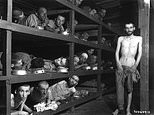Treasure hunters are warned to stay away from Buchenwald concentration camp
Treasure hunters are warned to stay away from Buchenwald after documentary claimed handwritten map points the way to hidden Nazi gold
- WARNING: Contains distressing photographs
- Treasure hunters have been warned against searching concentration camps
- A documentary claimed secret tunnels at Buchenwald could contain Nazi gold
- Buchenwald and its sub camps was used to house thousands of slave labourers
- Much of the Nazi war machine was sent underground to avoid Allied bombing
Treasure hunters have been warned to avoid a former Nazi concentration camp after a documentary claimed Hitler ordered stolen treasure to be buried in tunnels at the site.
More than 56,000 people died in Buchenwald and its satellite camps between 1937 and 1945 where the Nazis used slave labour to excavate massive tunnels initially used as giant factories
However, a new documentary claimed that the tunnels were later used to store valuables stolen from many of the six million Jewish people who were murdered in the Holocaust.


Inmates Buchenwald and its sub camps were used by the Nazis to build tunnels to transfer the regime’s war industries underground to avoid Allied air attacks


Buchenwald was opened in 1937 initially to house opponents to the Nazi regime and other groups such as gay people and socialists
The Buchenwald camp was located outside the German city of Weimar in an area which later formed part of the German Democratic Republic.
The documentary by broadcaster MDR claims that facing defeat, the Nazis used the tunnels to hide treasure looted from across Europe.
The Buchenwald concentration camp was liberated by American forces on April 11,1945 but the area ultimately fell under Soviet control and formed part of the German Democratic Republic.
The entrances to the tunnels were destroyed by the Soviets between 1947 and 1948, though rumours of a subterranean illicit haul have persisted.
According to the documentary, a handwritten map reportedly shows the location of the stolen valuables prompting fears that treasure hunters might try and retrieve the haul.
When the US Army liberated the camp, they discovered more than 21 tonnes of gold – much of it in the form of wedding rings and teeth from those murdered in Nazi death camps.
On September 23, 1940 Heinrich Himmler ordered the SS to recover gold teeth from dead inmates of concentration camps. He later extended the order to include ‘the golden teeth that cannot be repaired’ from those who are alive.


This group of Jewish young people survived their time at Buchenwald and left the camp following their liberation by the Americans a month earlier


Camp inmates pointed US soldiers towards a tunnel containing 21 tonnes of gold – much of it in the form of gold teeth and rings taken from Jewish victims of the Holocaust
The documentary claims that additional treasure may have been hidden into chambers blasted into the side of the complex’s tunnel system which were later bricked up.
However, historian Dr Jens-Christian Wagner, who is a world expert on Nazi concentration camps dismissed the claims.
The documentary suggested that two of the eight tunnel sections have yet to be searched.
Dr Wagner told The Times: ‘All the chambers have been opened.’
The map allegedly containing details of the treasure was located in the National Archives in Washington.
Nazi officials, it is claimed, wanted the treasure buried to prevent it from being captured by the Soviet Union who, in 1945, were advancing from the East.
Dr Wagner said the area has been thoroughly searched and all that has been recovered are mining equipment, old weapons and ammunition.


US military authorities ordered local residents from Weimar to visit the camp to witness the horror of what was happening a short distance from their homes
He added: ‘For many years we had considerable problems there with illegal visits to the tunnel. Sometimes we also find people with metal detectors. Our security guards are vigilant.’
As well as treasure hunters, officials at the former camp which is now a memorial have problems from far-right activists and holocaust deniers.
Officials have reported discovering swastikas being daubed on memorial sites as well as people posting Nazi salute selfies on social media.
Volkhard Knigge, museum director at Buckenwald said: ‘Messages glorifying Nazism or demanding the camps be reopened for foreigners have become more common.’
There are 15 former concentration camps on German soil which have been turned into memorial sites.
The most well-known among them, Dachau, Sachsenhausen, Neuengamme, Bergen-Belsen, Ravensbrueck and Buchenwald, received almost three million visitors in 2018.
But faced with the new challenge from the far right, many of the sites have been forced to adapt.
![]()


